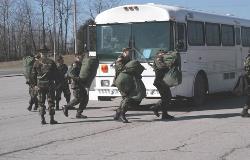 My first act upon returning from Cooperstown in 1965 was to deal with the 1A notice I had received from the draft board. To do nothing meant that I would be drafted and shipped off to Vietnam. Luckily, I got one of the last army reserve slots available in the Louisville area. That meant a six year obligation beginning with six months of active duty followed by 5 1/2 years in the reserves. But it also meant I avoided the draft. There was not a thing illegal or unpatriotic about it; it was an option available to anyone and I used no influence whatsoever; I just signed up and was accepted. Later, as the war escalated, the need for more and more troops meant that many young guys were being drafted. This eventually led to great resistance to the war and a lot of serious draft dodging, the illegal evasion of the draft.
My first act upon returning from Cooperstown in 1965 was to deal with the 1A notice I had received from the draft board. To do nothing meant that I would be drafted and shipped off to Vietnam. Luckily, I got one of the last army reserve slots available in the Louisville area. That meant a six year obligation beginning with six months of active duty followed by 5 1/2 years in the reserves. But it also meant I avoided the draft. There was not a thing illegal or unpatriotic about it; it was an option available to anyone and I used no influence whatsoever; I just signed up and was accepted. Later, as the war escalated, the need for more and more troops meant that many young guys were being drafted. This eventually led to great resistance to the war and a lot of serious draft dodging, the illegal evasion of the draft.
After getting military leave from Southern Bell, I left for basic training at Fort Knox. Losing your hair, your leisure, your individuality, was all part of basic training. Falling in at 4:00 a.m., being screamed at by strangers, push ups and marching everywhere was our daily diet. We entered
the mess hall only after swinging through overhead bars and shouting the chain of command all the way from the President down through our company commander. Our company C.O. was a lean, young first lieutenant just back from Vietnam who brooked no nonsense. He left the hands-on training to hard, grizzled sergeants able to wrest the last best effort from us all.
Before I knew it, “basic” was over and I was assigned to a tank maintenance unit for advanced
individual training. Life here was a bit more leisurely, living in a barracks without any harassment and with a normal work day. I even brought my Volkswagon onto base. We were supposed to be getting “on the job” training. But most of the actual work in the tank shop was done by civilians who fixed the tanks after the regular army guys had tried all day long to destroy them on the rough range. We trainees were regarded as pretty much in the way and got no real assignments much less any training so we quickly organized day – long card games to while away the time. Showing up in fatigues at the 7:00 a.m. formation was about the only real duty.
Finally, after finishing advanced training I was sent back to Louisville to serve the rest of the six years in the 100th Division based at Bowman Field in Louisville. We spent one weekend a month and two weeks each summer on duty.
At first these weekends were pretty boring. But then the anti-war protests and racial violence got really ugly with the burning of cities like Los Angeles, Detroit and Chicago and it seemed as if the whole country was coming apart with civil unrest. That’s when we started spending our army reserve weekends doing riot control training with gas masks on and rifles with fixed bayonets.
It was a scary time.
